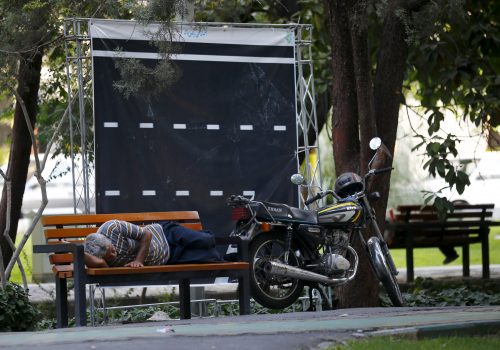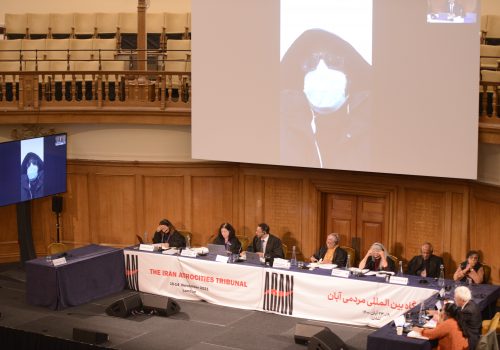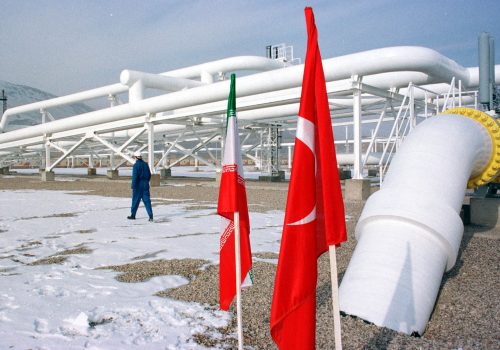Iran is preparing public opinion for a revival of the JCPOA
A new Iranian negotiating team appointed after the election of President Ebrahim Raisi took its time about returning to talks in Vienna and initially presented a very hardline stance. But, as US officials have warned that the “window is closing” for the effective revival of the 2015 Joint Comprehensive Plan of Action (JCPOA), Iranian officials are softening their demands and hinting at a deal in the near future.
Iranian Foreign Minister Hossein Amir-Abollahian notably said that Iran, “will not ignore the idea of direct talks with the US if this facilitates a suitable and guaranteed agreement.” Iran has refused to sit with the Americans in Vienna up until now, instead passing messages through other delegations to the talks. Supreme Leader Ayatollah Ali Khamenei even signaled the possibility of a direct dialogue with Washington earlier, noting that it was possible to “negotiate with the enemy” without surrendering to it.
Several factors are responsible for this change of heart, the most important of which is the realization that the potential failure of the Vienna talks will foreclose a sorely-needed economic recovery. Another factor is the clear impatience among American officials about the need to reach a deal before Iran’s nuclear program progresses even further. A third and crucial factor is the chance of a new military showdown with the US over Iraq. Although neither Iran nor the US want any escalation of tensions in Iraq, the activities of Iran-supported Shiite militias there have increased the risk of such a confrontation.
It seems that Tehran has softened the tough conditions it had set for a return to full compliance with the JCPOA. These had included removal of all US sanctions imposed by the Trump administration as well as a rejection of direct talks with the US in Vienna.
Several influential Iranian analysts and former officials say that these changes are strong signals of Iran’s willingness to return to full compliance even without having all its conditions met. Their view is that Khamenei, the primary decision-maker, has approved direct talks with the US because he needs to sort out the nuclear case before moving on to other issues.
Among these analysts is former top Iranian diplomat Javid Ghorban-Oghli, who has argued that the next round of talks in Vienna, due to start this week, “may be the final round.” He has also suggested that Russia and China, which are part of the Vienna negotiations, are not trustworthy allies for Iran.
Hardline media and figures are split on the issue of direct talks. While members of the parliament’s national security and foreign relations commissions and presiding board have said that they would approve such talks, more radical members have opposed them, though not very vehemently. According to the Iranian media, the hardliner-dominated parliament is clearly in favor of direct talks and opponents are “but a few isolated voices.”
Outside parliament, opposition to direct talks is limited to low-level extremists and students in remote universities.
Even a leaked letter from former Chief Nuclear Negotiator Saeed Jalili to Khamenei was disregarded as a publicity stunt designed to attract attention to Jalili, who was passed over as foreign minister and top negotiator after Iranian elections. Jalili argued that Iran should pull out of the JCPOA, start enriching uranium to 90 percent (weapons grade) purity, and then start immediate bilateral talks with the US on all issues.
Only one important newspaper, the hardline outlet Kayhan, opposed the idea of direct talks, but this opposition was largely discounted as well. The general understanding within Iranian media is that this opposition is a superficial show to prepare grassroots supporters of the regime for direct talks in the future. The chief editor of the Javan newspaper, a hardline outlet affiliated with the powerful Islamic Revolutionary Guards Corps, has openly supported the idea of direct negotiations from the beginning.
At the same time, the media in Iran appears to have moved on from the notion of reviving the JCPOA to the problems that may ensue after it is back in effect. Analysts correctly note that the agreement has many enemies in both Tehran and Washington who will seek to derail it if it is restored. In other words, the Iranian media has already passed the stage of the agreement and is looking into a post-agreement situation.
For example, an op-ed in the reformist Shargh newspaper has urged Iranian decision-makers not to make the same mistakes they did in the past and invest too much hope in the benefits of a JCPOA renewal. Another op-ed focused on the ways an agreement could be undermined by US lawmakers. Another analyst argued that Iran has no reason not to comply with its JCPOA commitments and warned that, if the agreement collapses during its implementation stage, it will not be Iran’s fault.
To sum up, the atmosphere in Tehran coming indirectly and implicitly from the main power centers is that a deal is more than possible—it is certain—and, if talks collapse, it will be the fault of the US. Judging by the Iranian media, Tehran is eager to make an agreement and it is Washington that seems hesitant. Tehran will come into compliance with the JCPOA once it is assured that another US withdrawal will not happen. This is the guarantee that Iran wants before it agrees to return to full compliance, which requires destroying or at least uninstalling its more advanced centrifuges and shipping out its excess stockpiles of enriched uranium (the US announcement on February 4, 2022 that it was restoring waivers necessary for other countries to work with Iran on civil nuclear cooperation was regarded as a positive signal for success of the talks).
The question that remains to be answered, as far as Tehran is concerned, is what if Donald Trump or a likeminded politician is elected in 2024, given the atmosphere in Washington. Tehran needs some guarantee that the Trump experience will not recur. Everything else is negotiable.
The author, who is well versed in the Iranian political scene, asked to remain anonymous.
Image: جولة سابقة من محادثات إحياء اتفاق إيران النووي في فيينا يوم 17 أبريل نيسان 2021. صورة من الدائرة الأوروبية للشؤون الخارجية حصلت عليها رويترز من طرف ثالث


